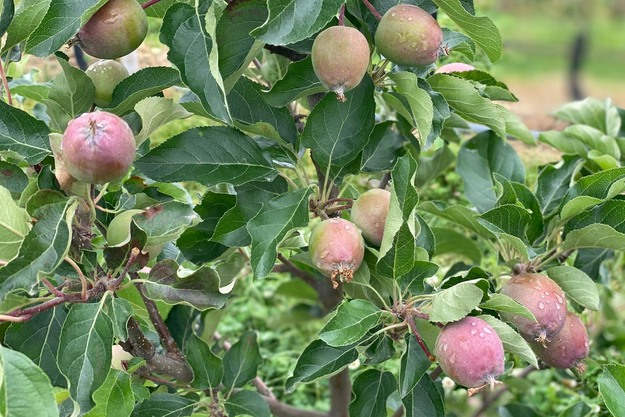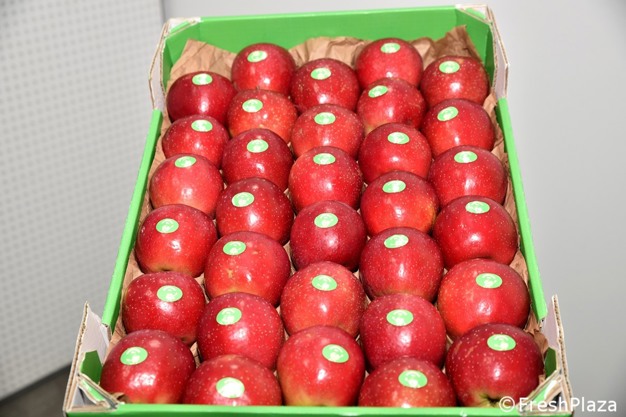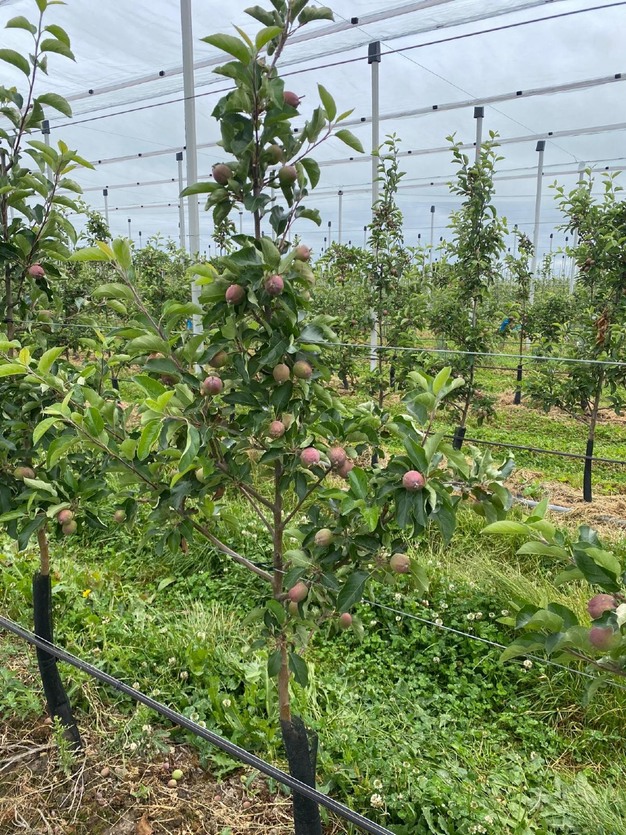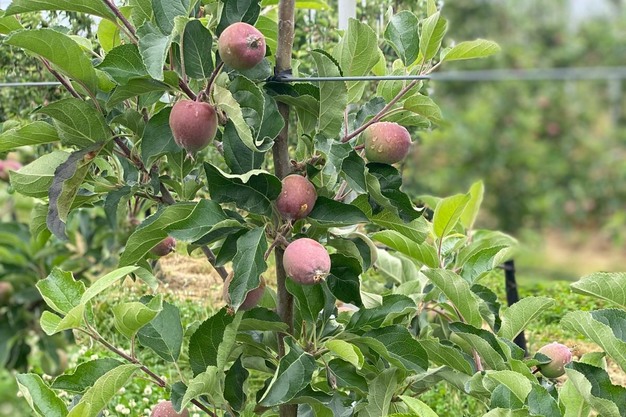Late last year, the new apple variety GoodnessMe® was introduced at Interpoma 2024. The apple was presented for the first time in Bolzano, where a larger hall had to be booked at the last minute due to overwhelming interest. Wouters Fruit holds the exclusive European licence for the GoodnessMe apple, and Kris Wouters sees great potential in it. “It’s impossible to be the best apple, as taste preferences vary widely, but the goal is to offer a good apple consistently. I’m convinced we’ll achieve that with GoodnessMe,” he says.

Still, there is much to learn, Kris points out immediately. “Heading into next season, we won’t really be selling it commercially yet. We have some third-year trees and some second-year ones, but not enough to supply the market. Most of the apples will be used for studies on storage, thinning, and other aspects. For now, it’s crucial to understand all the finer points of the variety. For example, the tree is very productive, which is great, but it can also be a drawback—insufficient thinning can lead to a turn year.”
“To investigate this, we are working very intensively,” he continues. “Chemical or manual thinning? What are the consequences? We have 300 trees, and last year we counted the exact number of buds per tree, how many apples were produced, and how many remained after thinning. So we know the complete history of each tree. This helps us learn how to manage the variety in the future and guide growers in cultivating GoodnessMe. You really have to get to know a new variety.”

The GoodnessMe apples at the presentation during Interpoma 2024
Responsibility to ensure optimal cultivation
“We’re conducting trials with different rootstocks, tree management, treatments, harvest timing, and storage. We also have a block that is completely bio-regenerative, meaning no chemicals are used—only bio-regeneratives. Because the variety is doubly resistant to scab and mildew, we only sprayed about five times this year. That’s a separate trial block where we take risks and push boundaries with organic and regenerative approaches. The goal is to see how far we can go with reducing crop protection use. Some things have failed, I’ll admit that, but that’s normal. Ultimately, we want to grow this variety as sustainably as possible, and that’s a full-time effort. So far, I must say we’ve been pleasantly surprised. There will undoubtedly be challenges that emerge, but for now, none have appeared,” Kris laughs.
 The launch has generated considerable interest from both organic and conventional growers. “Perhaps even a bit too much. We actually want to start primarily with Belgian growers, but there is interest from across Europe to plant the variety in the future. That’s certainly a good sign, but it also brings great responsibility for us to ensure this is done properly. If we succeed, I believe the future is very bright. Especially if the Green Deal regulations come into effect and key crop protection products are phased out. Then, cultivating many traditional varieties will become much more difficult. We’re already seeing this with Jonagold—even in a year with little rain, we’re still spotting scab here and there. A double-resistant variety like this, with attractive colouring and long-lasting crispness that doesn’t require intensive treatments, will be a blessing for many.”
The launch has generated considerable interest from both organic and conventional growers. “Perhaps even a bit too much. We actually want to start primarily with Belgian growers, but there is interest from across Europe to plant the variety in the future. That’s certainly a good sign, but it also brings great responsibility for us to ensure this is done properly. If we succeed, I believe the future is very bright. Especially if the Green Deal regulations come into effect and key crop protection products are phased out. Then, cultivating many traditional varieties will become much more difficult. We’re already seeing this with Jonagold—even in a year with little rain, we’re still spotting scab here and there. A double-resistant variety like this, with attractive colouring and long-lasting crispness that doesn’t require intensive treatments, will be a blessing for many.”
Productivity the biggest challenge
So, is it a difficult variety to grow? “No, not really. The apple is extremely fertile, according to lab tests. We’ve measured pollen tube growth—how quickly pollen travels to the egg in a flower—and it’s currently a champion in that regard. This means that once a flower is pollinated, it quickly becomes an apple. For other, less fertile varieties, that process might take a few days, but with GoodnessMe, it sometimes happens in just one day. That results in easy fruit set, but it can also backfire. If you don’t thin in time and leave too many apples on the tree, you’ll end up with small sizes and too few flower buds the next year. So it’s crucial to thin properly and on time to maintain good volumes. That’s currently the most difficult part to master. We’re testing both chemical thinning and mechanical methods, where some flowers are removed early to reduce the number of apples per tree. That’s particularly relevant for organic cultivation. We’re working on all of this and hope to soon offer guidance for both organic and conventional growers.”
There are currently four growers in Belgium who have planted the variety, but by next year, there will be many more, Kris assures. “When launching a new variety, there’s always a shortage of scion wood. Each year brings more scions, allowing for more trees to be propagated. For next season and the one after, availability will still be limited, but after that, there will be no more restrictions.”

Not the best apple, but a consistently good apple
Consumers haven’t yet had much opportunity to taste the new variety, but among the tasting panels, it has been well received, Kris notes. “These panels include a broad cross-section of people from different backgrounds, and they were very positive about the taste. Of course, it’s always hard to say an apple is ‘the best.’ Everyone has their own preferences and favourites. Taste is subjective, but as mentioned, what really matters is consistent quality. That’s also what made Pink Lady so successful, in my opinion. It might not always have the best flavour, but it consistently offers high quality. That’s our goal too—a consistently good apple on the shelf that consumers can rely on. Whether it’s your preferred taste or not, you should always know exactly what you’re getting when you pick up a GoodnessMe apple.”
For more information:
Kris Wouters
Wouters Fruit
Kasteellaan 21
3454 Rummen, Belgium
+32 (0)475283696
[email protected]
www.woutersfruit.be
Source: The Plantations International Agroforestry Group of Companies
